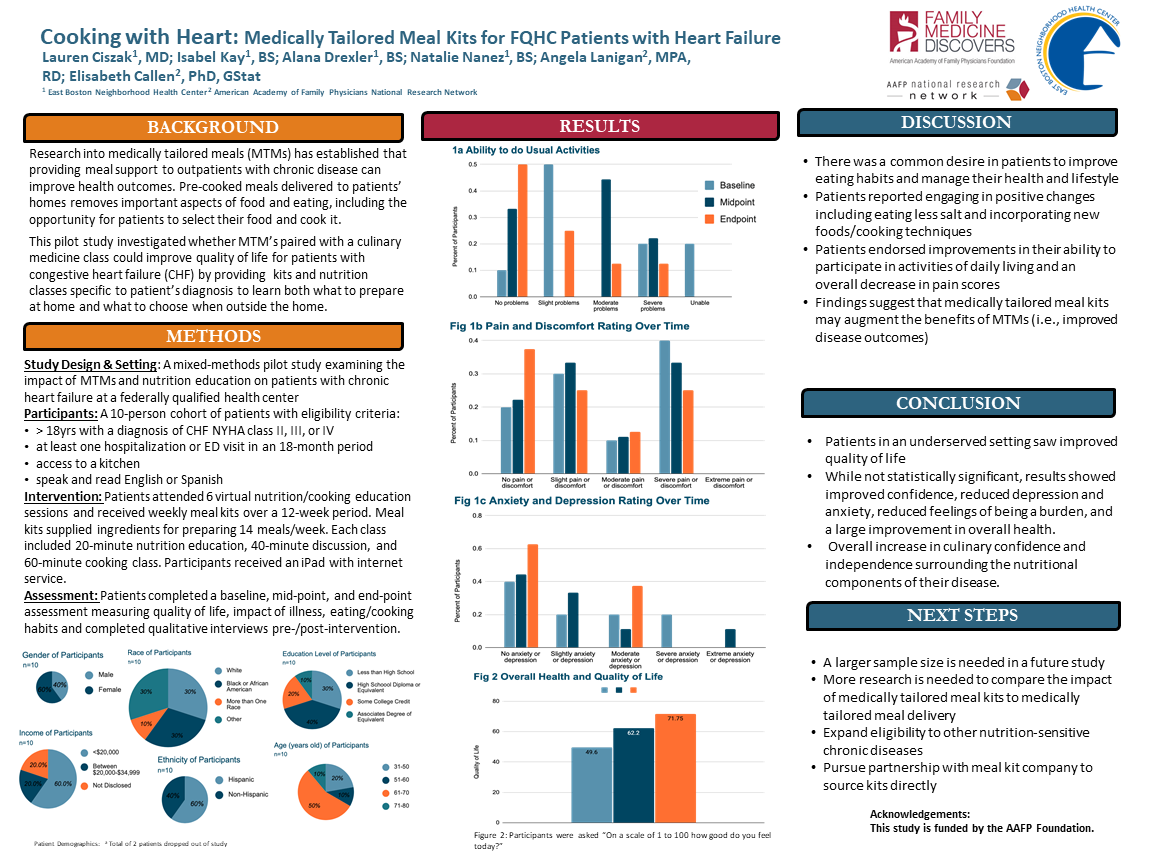PCR038: Medically Tailored Meal Kits as a Means of Decreasing Healthcare Utilization in Primary Care Patients with Heart Failure
Lauren Ciszak, MD; Alana Drexler, BS; Isabel Kay, BS; Bonnie Jortberg, PhD, CDE, RD, CDE; Elisabeth Callen, PhD; Angie Lanigan, MPA, RD; Natalie Nanez, BS; OLIVIA WEINSTEIN
Abstract
It is well established that providing meal support to primary care patients with chronic disease can drastically reduce healthcare utilization costs. However, most of the supporting research has been conducted with ready-to-heat/eat meals delivered to patients. Our research is investigating whether meal kits paired with a culinary medicine class component can help further reduce utilization in underserved populations by providing medically tailored meals and providing hands-on nutrition education.
Objective:
Determine if a 3-month-long meal kit service paired with targeted cooking classes improves quality of life amongst primary care patients with Heart Failure and at least one ED visit/Hospitalization visit in the past year.
Study Design: Mixed-methods pilot study evaluated impact of meal kits and cooking classes on quality of life.
Setting: Primary Care FQHC in Boston, MA.
Population Studied: Ten patients are 18 years or older, primary care patients, able to consent to participate, diagnosis of CHF NYHA class II, III or IV per medical record, at least one hospitalization or ED visit between 2/1/2019 and 7/1/2020, access to a kitchen with available refrigeration and heating element, speak and read English or Spanish.
Intervention:
Program consisted of 6 bi-weekly cooking classes and weekly meal kits with ingredients for 14 meals per week. Due to COVID-19, classes were virtual and meal kits were delivered to patients’ doors. Classes were in English and Spanish.
Outcome Measures:
Pre-, mid-, and post-intervention surveys collected info regarding nutritional understanding of the patient’s disease, Minnesota Living with Heart Failure Questionnaire (MLHFQ), and Quality of Life Survey (QOLS) (English and Spanish).
Results:
Six patients were female, four male. Majority (70%) had a high school diploma or less and made less than $35,000 (80%). Patients rated their health on a scale from 0 to 100: Pre: 49.6, Mid: 62.2, Post: 71.8 (p < 0.05). Multiple changes occurred over the three-month time period in patients’ MLHFQ. By the intervention end, fewer patients had issues with their heart failure than at the beginning.
Conclusions:
The meal kits and targeted cooking classes had an impact on the quality of life for the ten included patients with heart failure.

Jack Westfall
jwestfall@aafp.org 11/20/2021This is a great topic and research study. Nice work. Thanks